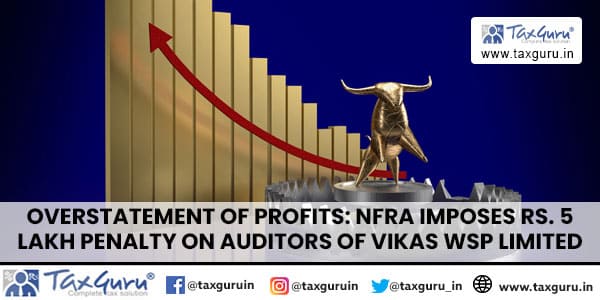Case Law Details
HIGH COURT OF DELHI
Commissioner of Income-tax
Versus
Vachanband Investment Ltd.
IT APPEAL NO. 84 OF 2010
SEPTEMBER 26, 2012
ORDER
S. Ravindra Bhat, J.
The Revenue which is in Appeal before the Court, is aggrieved by the order of the ITAT dated 13.03.2009 in ITA-2280/Del/2005. It urges the following substantial question of law for determination by this Court;
“Did the Tribunal err in law in finding that the loss declared by the assessee from the sale of shares of M/s J.P. Industries and Himachal Futuristic Company Ltd., could be treated as speculation loss enabling it to set off speculation loss against the profit available.”
2. The facts briefly are that the assessee filed its returns declaring income at Rs. 1,04,206/- on 30.10.2001 for AY 2001-02. It was engaged in business of sale and purchase of shares and government securities. The AO noticed that the assessee had earned profit of Rs. 1,48,22,000/- on sale 1,50,000 shares of ALPS industries out of its opening stock. This profit was sought to be set off mainly against the loss of shares on sale of J.P. Industries and Himachal Futuristic Company Ltd. The assessee had purchased the shares of J.P. Industries on 12.2.2001 (@ Rs. 88.35 per share); they were sold on 23.3.2001 @ Rs.33.95/- per share. Similarly, shares of Himachal Futuristic Company Ltd. were purchased on 8.1.2001 @ Rs. 1397 per share and sold on 28.2.2001 @ Rs.756.50 per share. The shares were purchased through M/s A. Nitin Capital Services and again sold through that concern. The AO after considering the materials on record and the circumstances which included opportunities granted to M/s A. Nitin Capital Services Pvt. Ltd. (through summons under Section 131 to furnish various documents and evidence, such as, purchase and sale books for the relevant period, explanation regarding trading cycle of shares purchased and sold, the complete details of the clients from whom shares of J.P. Industries were purchased and sold and copies of delivery note submitted for each cycle during the period February-March, 2001 etc.), on 9.3.2004, proceeded to hold that the assessee’s contentions were not acceptable. The AO held that the sale and purchase of shares of J.P. Industries were only in order to manoeuvre a loss through book entries which was a colourable device. He, therefore, treated the loss claimed as a sham transaction and disallowed the loss claimed by the assessee. As regards the loss incurred from purchase and sale of shares of Himachal Futuristic Company Ltd, the AO held as follows: –
“As regards the loss on the purchase/sale of shares of M/s Himachal Futuristic, the assessee coy. Has not furnished any evidence except the copy of account of the stock broker namely M/s A. Jain & Co (P) Ltd. The copy of the account of M/s A. Jain & Co. (P) Ltd. clearly suggests that it was a speculation loss as the assessee coy. Has been billed for amount difference, on the sale/purchase on various dates. That actual date of purchase or sale has not been mentioned in the copy of account. With the assessee coy. Failing to establish that the purchases/sales of shares were backed by actual delivery, the loss on the sale of shares of Himachal Futuristic is treated as speculation loss and not allowed to be set off against its business profits.”
3. The assessee carried the matter in appeal, contending that the sale of shares of M/s J.P. Industries was neither a sham nor could it be characterized as a manoeuvre on its part. It was submitted that the sale price in the case of both the concerns i.e. Himachal Futuristic Company Ltd. as well as J.P. Industries was close to the average sale price in the Delhi Stock Exchange and Bombay Stock Exchange where the said company’s share were traded. The CIT (A) did not accept the assessee’s contentions and reasoned thus: –
“Regarding the sale of shares of M/s J.P. Industries, it is seen that on 26.3.01, the appellant sold the shares at Rs.35.95. On that date the rate being quoted on the BSE was 35.50 and on the DSE it was 36.50. The shares of M/s. J.P. Industries were quoted at a much higher figure during this period. On 8.1.01 they were quoted at Rs. 45.45. On 8.2.01 they were quoted at Rs. 53.10. If the assessee was interested in selling the shares of JP Industries it could have sold the shares in the month of February itself when they were at a higher figure as compared to the price they were sold in March, 2001 to their sister concern. The appellant has also shown that the shares of M/s Himachal Futuristic were sold on 28.2.01 at Rs. 756.50. However, the quoted shares for quoted price for M/s Himachal Futuristic on 12.2.01 was Rs. 992. Again if the appellant has chosen he could have disposed the stock at a higher price a few days earlier. The very nature of the transaction entered into by the appellant shows that the purchase had been made at a higher price and not the prices quoted on the BSE. The sales have been made on dates when the price of the shares was at its lowest in the market. The appellant company has also not been the beneficiary of the dividend by these companies which has gone to M/s A. Nitin Capital Services according to the submissions made. The very fact that the directors of the two companies are so closely interrelated as also the fact that the necessary documents were not produced before the AO in the form of distinctive numbers of the shares traded, the books of accounts were not produced and repeated adjournments sought, establishes that the transaction was a sham transaction and not a genuine transaction. The close family connection between the 2 firms lays a higher onus on the appellant to establish that the transaction was a transparent normal commercial decision. Thus, the appellant has failed to do in the form of supporting evidence.”
It was also held that: –
“Therefore, looking into the facts of the case, the close family connection between the appellant company and M/s A. Nitin Capital Services, it is held that there does not appear to be a normal business transaction. It appears to be an attempt to create losses in share dealing to reduce the profit made on sale of share. The case laws relied upon emphasis that such losses cannot be allowed as a deduction. Therefore, relying on the case laws, it is held that the AO has correctly not allowed the claim of loss in the case of M/s J.P. Industries. Addition made of AO is confirmed.
The AO has treated the loss in case of M/s Himachal Futuristic as a speculation loss. In the case of M/s Himachal Futuristic as the transactions were settled by difference, in view of Section 43 (5) of the Income Tax Act read with Section-73, the AO has correctly treated it as speculation loss.”
In view of the above reasons, the CIT (A) rejected the assessee’s claims.
4. The Tribunal on an appeal by the assessee held that merely because there was some minor difference between the market price and the negotiated price which was natural having regard to the private nature of the sale, the transaction could not be termed as sham. The Tribunal was considerably influenced by the assessment order made in the case of M/s A. Nitin Capital Services. Apparently, it showed the turnover of Rs. 71.98 crores on the sale of shares on its own account and the trading loss was accepted as speculative loss. The Tribunal held that the list of distinctive number of shares transacted by the assessee attached to the purchase and sale bills, tallied with the figures and the consideration specified. These were, in its opinion, available with the AO and were also reflected in the ledger account of M/s A. Nitin Capital Services. It was, therefore, held that once the transactions were accepted as genuine in the hands of M/s A. Nitin Capital Services, they could not be held to be bogus in the hands of the assessee. The Tribunal felt that Explanation to Section 73 also applied since the assessee was dealing in purchase and sale of shares of other companies in addition carrying on business of dealing with government securities. Such business of sale and purchase of shares of other companies, according to the Tribunal, has to be deemed as speculative business and consequently any income or loss generated from such activity had to be treated as only speculation profit or speculation loss. The Tribunal, therefore, allowed the appeal.
5. The Revenue urges in the present appeal that the lack of any material to substantiate the genuineness of the transactions, the fact that even dividend was not enjoyed by the assessee for the period that it claimed to hold the shares of the two companies, the fact that no delivery of shares was effected and most importantly that shares were sold at the lowest price, clearly pointed to the sham nature of the transaction and the intention of the assessee to claim losses only for the purpose of setting off its profit. It was also argued that most importantly there was no evidence showing that consideration had ever been paid for the shares and that only book entries were made. Counsel emphasized that merely because the shares were shown to have been purchased on a particular date and sold later, there can be no assumption that they were actually traded and for the relevant period actually held by the assessee. Having regard to these circumstances, the Tribunal fell into error in upsetting the concurrent findings of the lower authorities.
6. Counsel for the assessee urged that no substantial question of law arises for consideration and that what is sought to be urged by the Revenue are same questions of fact, the findings of which have become final. That apart, counsel also argued that the Tribunal had occasion to deal with the assessment orders pertaining to the so called sister concern of the assessee i.e. M/s A. Nitin Capital Services. The Tribunal pertinently noticed that the very same transaction was accepted in the hands of the Nitin Capital Services and the losses booked by it were not challenged. In these circumstances, there was nothing wrong or unreasonable on the part of the Tribunal to hold that the transactions at the end of the assessee also were likewise genuine.
7. Counsel for the assessee also argued that the assumption of the lower authorities that Directors of both the assessee and M/s A. Nitin Capital Services were common was contrary to the records. There was no material save the lone circumstance that one of the Directors was common to both the concerns. There was no finding of inter relationship between the two concerns in the sense that either the assessee or M/s A. Nitin Capital Services had interconnected share holdings. In these circumstances, there could not have been an assumption of inter relationship and a consequent finding that document and books were maneuvered to help the assessee. Learned counsel lastly relied upon the fact that the transaction insofar as it pertained to M/s Himachal Futuristic was treated by the authorities as a speculative loss. If such were the case, the facts pertaining to the J.P. Industries were no different. Having regard to these factors, it was urged that this Court should not disturb the Tribunal’s findings.
8. In order to appreciate the controversy, it would be appropriate to reproduce in tabular form the details of the transaction with regard to shares undertaken by the assessee. The table is self evident and explains the dates of purchase and sale, the purchase rate and the rate at which the shares were sold etc. The said table is as follows: –
| S. No. | Date of Purchase | Name of the Company | Purchase Rate | Date of Sale | Rate at which sold | To whom sold | Loss/ Profit |
| 1 | 12.2.01 | J.P. Industries shares purchased from A. Nitin Capital Services Ltd. No. of Shares 214000 | Rs.88.35 Total Rs.18906900 | 23.3.01 | Rs.35.95 | A Nitin Capital Service Ltd. Rs.7693300 | Rs.11213600 Loss |
| 2 | 8.1.01 | Himachal Futuristic purchased from A. Jain & Co. (P) Ltd. No. of Shares 4700 shares | Rs.1397 Total Rs.6565900 | 28.2.01 | Rs.756.50 | 3355550 sold to A Nitin Capital Services Ltd. | Rs.301035 Loss |
| 3. | ALPS 15000 shares | Total Rs.9419700 | 17.6.00 | Rs.24235425 | Rs.14815725 Profit |
9. In this case, the AO scrutinized the bills from M/s A. Nitin Capital Services and noticed that they were not serially numbered; they did not contain any voucher number, ledger folio number. They merely described the sale price of the shares of M/s J.P. Industries. The shares were apparently physically traded and not on de mat bases. M/s A. Nitin Capital Services was issued with summons and time was provided for its representative to explain the facts and circumstances. After repeated accommodation, the AO proceeded to frame the assessment orders since cooperation was not forthcoming. The order of the AO would reveal that on 5.3.2004, the assessee was asked to explain why its loss on the sale and purchase of J.P. Industries’ shares should not be treated as sham; its response was made on 9.3.2004, stating that shares were backed to the actual delivery. However, no further facts were forthcoming. The lacunae pointed out by the AO in this regard were that dividends in the shares concerned had not been enjoyed by the assessee even for the period it claimed to have held the shares. The shares were held in fact for a very short period; there was no evidence of any delivery being effected or any consideration actually having passed between the parties. The assessee relied almost entirely on book entries made in that regard. The other important circumstance, which the AO and the CIT (A) took into consideration, was that the sale of shares was done when their value had dipped to half of their purchase price. Although the Tribunal was persuaded to rule in favour of the assessee on the ground that such sale price approximated the existing market price, the matter cannot be viewed in isolation. The fact remains that there was no delivery of the shares and on both occasions i.e. at the time of purchase as well as at the time of sale, it was only the sister concern M/s A. Nitin Capital Services which was involved in the transaction.
10. In the judgment reported as UOI v. Playworld Electronics (P.) Ltd. [1990] 184 ITR 308 (SC), it was held as follows: –
“….It is true that tax planning may be legitimate provided it is within the framework of law. Colourable devices cannot be part of tax planning and it is wrong to encourage or entertain the belief that it is honourable to avoid the payment of tax by dubious methods. It is the obligation of every citizen to pay the taxes honestly without resorting to subterfuges. It is also true that in order to create an atmosphere of tax compliance, taxes must be reasonably collected and when collected, should be utilized for proper expenditure and not wasted. It is not necessary, in the facts of this case, to notice the change in the trend of judicial approach in England. While it is true as observed by Chinnappa Reddy J. in Mc. Dowells and Co. Ltd. v. CTO [1985] 154 ITR 148 (SC) that it would be too much to expect the legislature to intervene and take care of every device and scheme to avoid taxation and it is up to the court sometimes to take stock to determine the nature of the new and sophisticated legal devices to avoid tax and to expose the devices for what they really are and to refuse to give judicial benediction. It is necessary to remember, as observed by Lord Reid in Greenberg v. IRC [1970] 46 TC 240 (HL) that one must find out the true nature of transaction. It is unsafe to make bad laws of hard facts and one should avoid subverting the rule of law….”
11. The reasoning of the Tribunal that the acceptance of M/s A. Nitin Capital Services’ claims in its returns would lead to the inference that the transactions with the assessee were genuine, in the opinion of this Court, is too broad to be accepted. The impugned order does not reveal whether the assessment was made under Section 143(1) or whether it was completed under Section 143(3). Furthermore, it is not clear as to how M/s A. Nitin Capital Services’ books and other particulars were made available, especially, having regard to the fact that its representative sought repeated adjournments and since he did not furnish the necessary particulars after receiving summons under Section 131. Having regard to these circumstances, the fact that M/s A. Nitin Capital Services’ assessments were completed, could not have been decisive as far as the assessee’s claims in the present case are concerned.
12. So far as the assessee’s submissions with regard to acceptance by the AO of the transactions vis-à-vis Himachal Futuristic Company Ltd. is concerned, this Court is not persuaded by the contention. In the case of that transaction too, the sale price was Rs.751.50/-. The purchase price was Rs.1397/-. The materials on record – available in the AO’s order – would further reveal that as on the date of sale of shares of Himachal Futuristic, the quoted price on 12.2.2001 was Rs. 992/-.
13. The Appellate Commissioner noticed that the assessee could have disposed of stock at higher price on 12.12.2001 when the shares of J.P. Industries were sold. However, the correctness of those findings cannot be gone into since that amount was not brought to tax and the assessee’s claim of loss of Rs.29,89,886/- was not allowed to be set of against its business profits.
14. In the light of the above discussion, the appeal has to succeed; the AO’s order, as modified by the CIT (A) is restored. The substantial question of law is answered in favour of the revenue. The Appeal is allowed to the above extent. No costs.






















After studying this case I called it as Market Manipulation. Market manipulation is a deliberate attempt to interfere with the free and fair operation of the market and create artificial, false or misleading appearances with respect to the price of, or ma